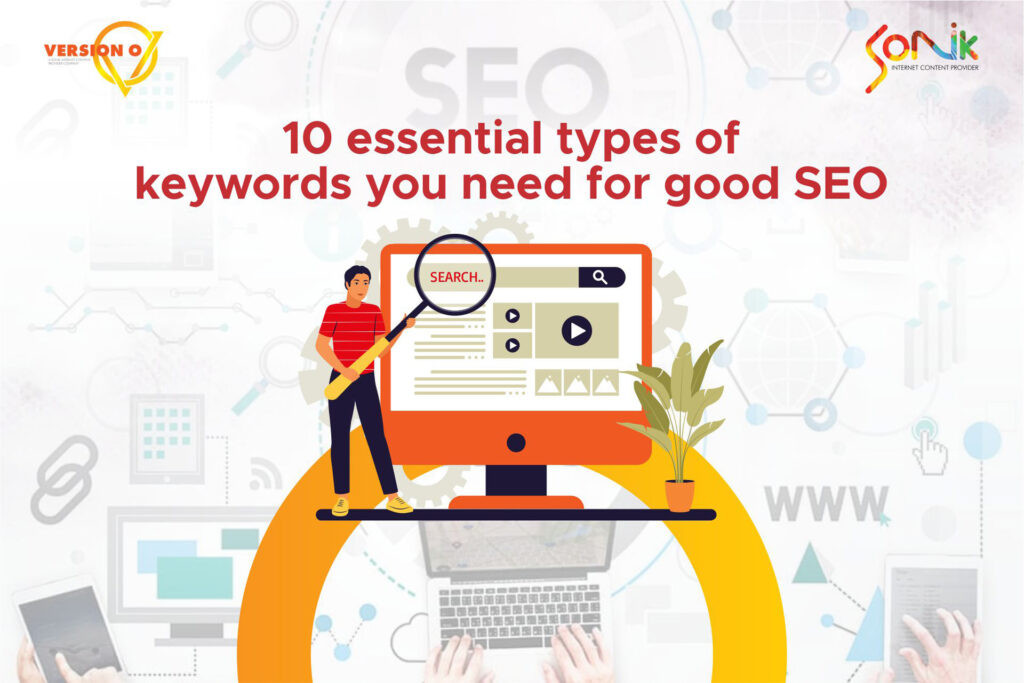For any kind of business today, a digital presence is almost mandatory. And for this to work, the importance of search engine optimisation (SEO) can hardly be understated. Within the broad topic of SEO, keywords play an extremely important role – but how well do you understand them?
Keywords are a crucial factor in driving organic traffic to your website and growing your online presence. Every SEO effort first begins with keyword research, which involves identifying the words and phrases people use when searching for products or services online.
Then comes the process of optimising all your website content to feature those chosen keywords in the most effective manner for both humans as well as search engine algorithms to understand. In this article, we’re going to help you understand keywords in more detail, and later, we’re going to look at the various kinds of keywords you need to keep in mind to optimise your brand’s or company’s website to attract your chosen target audience.
What are keywords?
Keywords are simply the words and phrases that best represent the main topics and ideas covered in your website content. Think of it like this: If someone were to ask you to describe what your company/brand/service is all about, the words and phrases you use to explain it would likely be your keywords.
These keywords are important because they help search engines like Google understand what your website is about and make it more likely that your site will appear in relevant search results, preferably above your competitors’ (how to achieve that is a whole exercise in itself, which we won’t go through here).
Why is using the right keywords important?
In the online world, everything runs on keywords. Barring the small number of times you’d enter a known website URL directly, most people’s search journeys begin by typing something into a search engine search bar – and the words they type are keywords. Then, based on the results that show up, they click on one or more links, and proceed further to fulfil their present requirement.
So, if you want people to land up on your website for the right query, you need to ensure you’re using the right keywords to attract more targeted visitors and potential customers. This is one of the best ways to increase your visibility in search engine results and make it easier for people to find your website.
How many different types of keywords are there?
As you may have gathered from the name of this blog, there isn’t just one kind of keyword you need to optimise for. Depending on how you divide them, there can be dozens of different kinds of terms you may need to incorporate into your online content to improve your SERPs and visibility.
Here, we’ll narrow them down to just ten – which are absolutely essential for every kind of online business.
10 top types of keywords you need to focus on
These keywords will help you optimise your website’s content and improve your chances of ranking higher on SERPs, resulting in increased website traffic, leads, and sales.
1. Short-tail keywords
Short-tail keywords, also known as head keywords, are short and general search terms that consist of one or two words. These keywords typically have a high search volume but are highly competitive, making it difficult to rank for them. Think of words like ‘tea’ or ‘shoes’.
Without being more specific, you’re likely to get tens of thousands of hits for each of these terms. However, just because of this reason, short-tail terms can still be valuable for your SEO strategy because they can generate a significant amount of traffic if you manage to rank for them.
Needless to say, the more niche your business is, the more you can benefit from your specific short-tail keywords. (Think ‘oolong tea’ vs just ‘tea’.)
2. Long-tail keywords
Long-tail keywords are longer and more specific search terms that consist of three or more words. These are the most common types of terms people actually search for – research actually shows that more than half of search queries contain 4 or more words.1 This means your audience is already searching for long-tail keywords.
These keywords typically have lower search volumes but are less competitive, making it easier to rank for them. They are also often more targeted and tend to convert better as they reflect more specific user intent.
For example, think of terms like “best running shoes for women” or “affordable digital marketing services for small businesses.”
So, the more specific and targeted long-tail keywords you incorporate into your SEO strategy, the more likely you are to capture highly relevant and intent-driven traffic to your website.
3. Location-based keywords
If you have a local business, incorporating location-based keywords into your SEO strategy is crucial. These keywords include specific geographic locations, such as city names, state names, or neighbourhood names, and help you target customers in your local area. For example, “plumber in Mirdif” or “best pizza in Al Barsha.”
According to Google, 46% of all searches have a local intent2, which means people are actively looking for products or services in their local area. By optimising your website with location-based keywords, you can improve your local search visibility and attract more potential customers in your area.
4. Branded keywords
Branded keywords are search terms that include your brand name or variations of it. These keywords are important as they help you establish brand awareness, protect your brand’s online reputation, and drive targeted traffic to your website.
For example, think “Nike shoes” or “Apple iPhone”. The simple reason is that branded keywords tend to get up to 50% higher CTR (because people already know which brand they’re looking for if they’re searching by its name).3
This highlights the significance of incorporating branded keywords into your SEO strategy to capture potential customers who are already familiar with your brand. Again here, the amount of focus you need to dedicate depends on how important your brand name is to your services.
For example, if you manufacture branded items, then you absolutely need branded keywords to be tied to your brand name. However, a company offering washing machine servicing would do better to rank for the brand names of the machines they service rather than their own brand name.
5. Product or service keywords
These are specific search terms that describe the products or services you offer. These keywords are crucial as they help you attract potential customers who are actively looking for the products or services you provide. For example, “graphic design services” or “handmade soap”.
Including product or service keywords in your SEO strategy allows you to target users with high purchase intent, as they are actively searching for something that you can specifically offer them. This can lead to higher conversion rates and increased sales for your business.
6. Question-based keywords
Question-based keywords are search terms that start with question words – “what,” “how,” “why,” “where,” and “when.” These keywords reflect users’ informational intent, as they are looking for answers to specific questions. For example, “how to bake a cake” or “why is my printer showing E2 error”.
These types of search terms are important because incorporating them allows you to answer users’ questions, providing them valuable information or a solution. If they get the right guidance from you, that alone might be enough to convince them to do business with you.
Further, by addressing common questions related to your specific products or services, you can establish yourself as an authoritative source and attract users interested in these topics.
7. Competitor keywords
Competitor keywords are search terms that include the names of your competitors or their products or services. These keywords allow you to target users who are actively researching or comparing your business with your competitors. For example, “best alternatives to XYZ product” or “comparisons between Company A and Company B”.
By highlighting the unique value proposition of your products or services compared to your competitors, you can potentially win over users who had earlier preferred your competitors, and convert them into your customers.
8. Seasonal keywords
Seasonal keywords are search terms that are relevant only during specific seasons or times of the year. They can be related to holidays, events, or seasonal trends. For example, “Valentine’s Day gifts” or “Christmas campaign ideas”.
Creating timely and relevant content around seasonal keywords is yet another way to attract users. The point is not to wonder if your product or service is seasonal – if it is, then this is all the more crucial for you. But even if you offer an evergreen product or service, it is still important to capture seasonal search queries and direct them to your website.
9. Industry-specific keywords
These are search terms that are relevant to your specific field, industry, domain or niche. They allow you to target users who are interested in your industry or have a specific need related to your niche. For example, “digital marketing tips for small businesses” or “real estate investment strategies”.
Often, people are on the lookout for the most trustworthy information from reputed industry sources. By showcasing your expertise and optimising that content using industry-related search terms, you can try to ensure that you are the expert who shows up most often for common search queries. This in turn can build both awareness and engagement with your brand as people consider you to now be a reliable source in your chosen field.
10. Action-based keywords
Action-based keywords are search terms that reflect users’ intent to take a specific action, such as making a purchase, signing up for a newsletter, or contacting a business. These keywords include action verbs or phrases that indicate a specific action. For example, “buy,” “order,” “subscribe,” “download,” or “contact.”
In other words, these are keywords that function as calls to action or CTAs. By optimising your website with such terms, you can guide users towards the desired action, such as making a purchase or submitting a contact form.
Get your keywords right to stay ahead of the curve
In conclusion, incorporating a diverse range of keywords into your SEO strategy is essential for small business owners and entrepreneurs who want to grow their online presence. If you focus on the ten types of keywords we’ve explained above, you can optimise your website’s content and meta-data to attract targeted traffic, increase visibility on search engine results pages (SERPs), and ultimately drive more conversions and revenue for your business.
Remember to conduct thorough keyword research to identify the most relevant and effective keywords for your business. Utilise keyword research tools, such as Google Keyword Planner or SEMrush, to identify search volumes, competition levels, and trends associated with different keywords.
If you’re looking for help with identifying the right keywords for your business, don’t worry. Just drop us a line and our SEO experts will contact you to take things forward!
Liked this article? Make sure to follow our blog for more updates – and follow us on Instagram, LinkedIn and Twitter too for regular tips and tricks!
References:
- Wordstream, 8 Super-Fascinating Digital Marketing Stats Revealed at SMX East
- Social Media Today + Go Gulf, 12 Local SEO Stats Every Business Owner and Marketer Should Know in 2019
- Advanced Web Ranking, CTR Study




